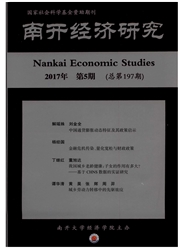

 中文摘要:
中文摘要:
传统的契约理论基本上都是以自利偏好为基础,然而大量实验研究和经验证据都表明,一部分人具有社会偏好,这部分人在经济交往中,不仅仅只关心自己的物质收益,同时还关心他人的收益状况或行为动机,这一点对于人们的市场竞争、组织合作和契约治理行为具有重要影响。本文的目的在于使用比较制度实验的研究方法考察互惠、信任等社会偏好及其作用机制对几种典型治理结构治理效率的影响。实验发现,与社会偏好互补的治理结构可以提高治理效率,而将社会偏好挤出的治理结构却会降低治理效率。
 英文摘要:
英文摘要:
The standard contract theory assumes that all people are self--interested,but lots of experimental and empirical researches show that people exhibit social preference ,which will have an important impact on people's competition,co--operation and contracts enforcement behavior. This paper focuses on investigating the influence of social preference on governance efficiency of explicit governance structure by comparative institutional experimental approach. The experiment results argue that the explicit governance structure which is complementary with social preference will improve the governance efficiency,but the explicit governance structure which is crowding out social preference will undermine governance efficiency.
 同期刊论文项目
同期刊论文项目
 同项目期刊论文
同项目期刊论文
 The Institution Efficiency of Stock Price Limits:An Experimental Analysis on the Two Stocks Market w
The Institution Efficiency of Stock Price Limits:An Experimental Analysis on the Two Stocks Market w Building Core Competencies in a Turbulent Environment: An Exploratory Study of Firm Resources and Ca
Building Core Competencies in a Turbulent Environment: An Exploratory Study of Firm Resources and Ca Oversea Listing, Voluntary Governance and Corporate Performance--A Case Study Based on the ‘Sinopec’
Oversea Listing, Voluntary Governance and Corporate Performance--A Case Study Based on the ‘Sinopec’ A study of fairness judgments in China, Switzerland and Canada: Do culture, being a student, and gen
A study of fairness judgments in China, Switzerland and Canada: Do culture, being a student, and gen 期刊信息
期刊信息
